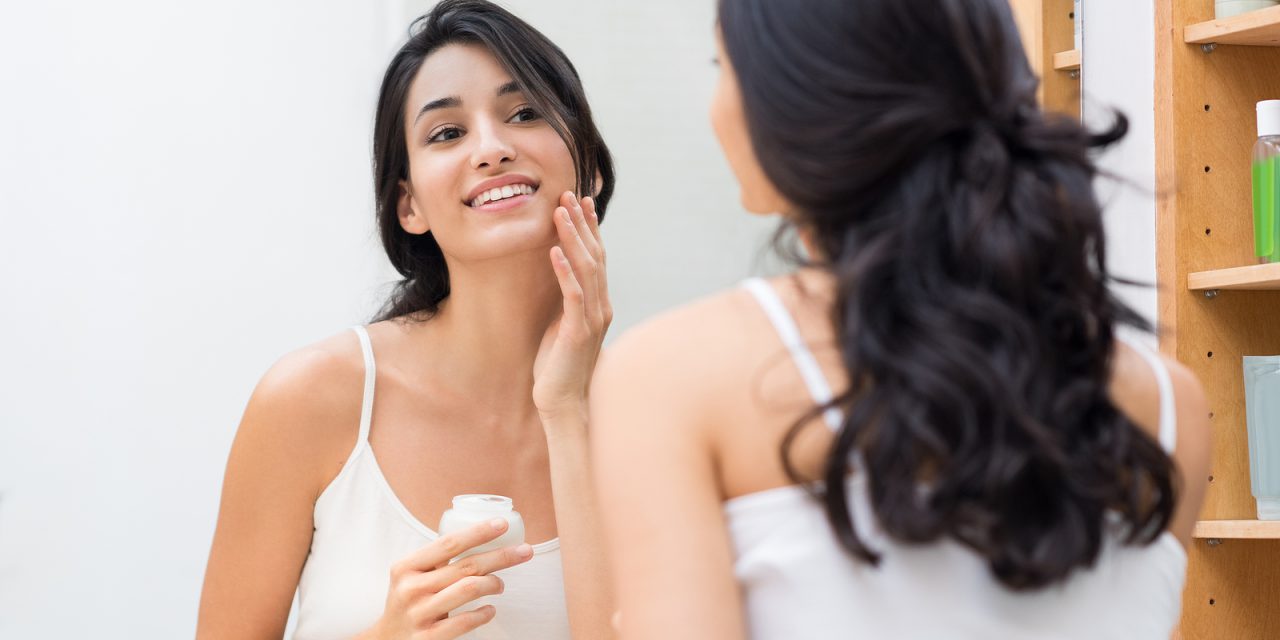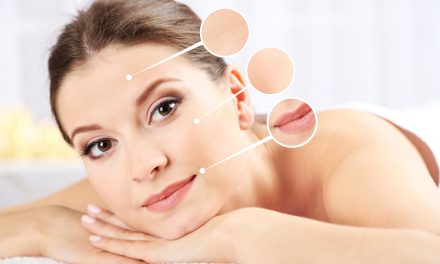Drinking enough water is important for keeping skin healthy and hydrated. Water helps maintain skin elasticity, supports cell renewal, and keeps the skin looking fresh and smooth. However, water alone is not a complete solution; combining good hydration with a balanced diet and proper skincare is essential for the best results.

To plan a diet that supports skin health, it’s important to focus on daily water intake along with nutrients that promote skin function. About 2.25 liters of water daily is often recommended for healthy skin. Paying attention to what and how much you drink, as well as your overall lifestyle, can make a noticeable difference in skin moisture and appearance over time.
Key Takeaways
- Drinking enough water helps maintain skin moisture and elasticity.
- A balanced diet and hydration support overall skin health.
- Healthy lifestyle habits amplify the benefits of water intake for skin.
The Science Behind Water Intake And Skin Health
Water plays a key role in keeping skin healthy by supporting its natural functions. It helps maintain elasticity, protects the skin barrier, and prevents common issues linked to dryness and irritation. Understanding how hydration impacts skin at the cellular level clarifies why daily water intake matters.
Role Of Hydration In Skin Physiology
Hydration directly affects skin cells by maintaining their volume and function. Well-hydrated skin cells support proper nutrient transport and waste removal. This process helps skin stay smooth and resilient.
Water intake influences the skin’s elasticity and promotes the turnover of skin cells. When the body is hydrated, skin cells regenerate efficiently, reducing dryness and flaking. This hydration supports the skin’s structure and helps it respond better to environmental stress.
Higher water consumption may improve skin moisture content, particularly in those with normal or dehydrated skin. Studies suggest that a balanced diet with sufficient water can aid normal skin physiology and improve biomechanics like elasticity and firmness.
How Water Affects Skin Barrier Function
The skin barrier protects against irritants, microbes, and water loss. Proper hydration helps maintain this barrier’s strength and flexibility. When skin is well-hydrated, it seals in moisture and keeps harmful elements out.
Water supports the outer layer of skin, called the stratum corneum. This layer acts like a shield, preventing moisture evaporation. Without enough water, this barrier cracks and becomes less effective.
Drinking enough water works alongside natural lipids and proteins to keep the barrier intact. This reduces the chance of redness, irritation, and sensitivity caused by a weakened barrier.
Dehydration And Common Skin Problems
Dehydration causes the skin to shrink and tighten, which can worsen common issues. Dry skin often appears flaky, rough, or dull because it lacks moisture at the surface.
Low water levels increase the risk of skin disorders like eczema and psoriasis. These conditions involve barrier disruption and inflammation, which water helps to control.
Dehydrated skin also shows more fine lines and wrinkles due to loss of plumpness. While water alone won’t erase these signs, it supports skin health by reducing tightness and improving softness.
Maintaining adequate hydration can ease symptoms and improve the skin’s appearance over time. Drinking water benefits not just skin hydration but also the body systems that influence skin condition overall, according to research on water’s effect on skin hydration and biomechanics.
There’s a product that supports skin health by promoting optimal hydration and nutrition, helping you plan your diet for glowing, healthy skin. It offers essential guidelines to balance water intake and nutrients effectively. Let me know if you’d like more information! Learn more on our YouTube Channel Here: Valleant Health, or see us on Facebook Here: https://www.facebook.com/valleant
Daily Water Requirements For Optimal Skin Health
Water intake directly affects skin moisture, elasticity, and overall appearance. The amount needed varies by person, but following clear guidelines and recognizing hydration signs helps maintain healthy skin. Understanding personal factors that impact water needs ensures the best results.
Guidelines For Proper Hydration
Experts often recommend about 2.25 liters (around 9 cups) of water daily for healthy skin. Another way to estimate this is by dividing body weight in pounds by two to find the ounces needed per day. For example, a person weighing 150 pounds should aim for about 75 ounces of water.
Drinking water consistently throughout the day is better than consuming large amounts at once. Besides plain water, fluids from fruits, vegetables, and other drinks count toward daily hydration. These habits support skin elasticity and promote cell renewal.
Combining water intake with good skincare practices enhances skin moisture levels. Drinking water alone may not fully improve skin health without proper cleansing and moisturizing routines.
Signs Of Adequate Hydration
Clear, smooth skin is a key sign of proper hydration. Well-hydrated skin feels soft and elastic rather than dry or tight.
Other signs include a balanced complexion without flaky patches or redness. Hydrated skin tends to recover quicker from minor irritations or wounds.
Urine color can also reflect hydration; pale yellow suggests sufficient water intake. Dark yellow or strong odor may indicate the need to drink more water.
If lips are moist and not cracked, and there is minimal itching or irritation, hydration is likely adequate.
Factors That Influence Individual Needs
Several factors change how much water a person needs for healthy skin. Physical activity increases water loss through sweat, which means more intake is required.
Climate also matters—hot or dry weather can cause faster dehydration. People living in such areas should drink more water.
Age affects skin hydration, too. Older adults may need extra water as skin loses moisture more easily with time.
Diet impacts water needs as well. Eating salty or spicy foods can increase fluid requirements.
Health conditions like fever or illness can raise water loss, and you should adjust your daily intake accordingly.
These factors mean water needs vary and should be personalized for best skin care results.
Learn more about these hydration details from the Hydration Connection’s guide.
Dietary Planning For Healthy Skin
Good skin health depends on both hydration and the right nutrients. Water intake supports skin moisture and repair, while specific vitamins and minerals help protect and renew skin cells. Planning meals that combine fluids with nutrient-rich foods creates a strong foundation for clearer, healthier skin.
Balancing Water Intake With Nutrient-Rich Foods
Drinking enough water keeps skin hydrated and helps maintain its barrier against irritants. However, hydration alone is not enough. He or she should eat foods with high water content, such as cucumbers, watermelon, and oranges, which add extra moisture.
It is important to balance water intake with foods rich in antioxidants and essential fats. These nutrients reduce inflammation and support skin cell function. Foods like leafy greens, nuts, and fatty fish boost overall skin health when combined with proper hydration.
Carrying a water bottle and setting regular drinking reminders can help maintain hydration throughout the day.
Essential Vitamins And Minerals For Skin
Vitamins C, E, and D play key roles in skin repair and protection. Vitamin C supports collagen production, which keeps skin firm. Vitamin E helps shield skin from damage caused by UV rays and pollution. Vitamin D aids skin cell growth and repair.
Minerals such as zinc and selenium are also important. Zinc helps control inflammation and supports wound healing. Selenium serves as an antioxidant, protecting skin cells.
Omega-3 fatty acids reduce dryness and may improve skin elasticity. He or she can find these nutrients in foods like citrus fruits, nuts, seeds, fatty fish, and eggs.
Sample Meal Ideas For Hydrated Skin
Breakfast could include a smoothie made with spinach, orange, and flaxseeds, combining hydration and antioxidants. Lunch might be a salad with mixed greens, avocado, walnuts, and grilled salmon for omega-3s and vitamins.
For snacks, celery sticks or watermelon chunks offer water content, while almonds provide vitamin E. Dinner could feature roasted sweet potatoes, steamed broccoli, and lean chicken to supply vitamins A, C, and zinc.
Drinking water consistently throughout the day should accompany meals to help maintain steady skin hydration.
There’s a product that supports skin health by promoting optimal hydration and nutrition, helping you plan your diet for glowing, healthy skin. It offers essential guidelines to balance water intake and nutrients effectively. Let me know if you’d like more information! Learn more on our YouTube Channel Here: Valleant Health, or see us on Facebook Here: https://www.facebook.com/valleant
Impact Of Beverages On Skin Hydration
The type of beverage a person drinks affects how well their skin stays hydrated. Some drinks supply more water to the body, while others can have drying effects. Understanding these differences helps plan a diet that supports healthy skin.
Water Vs. Other Hydrating Drinks
Water is the best choice for skin hydration. It directly replenishes fluids without added sugars or chemicals. Drinking plain water helps maintain skin elasticity and supports cell renewal.
Other drinks like herbal teas and diluted fruit juices also add hydration, but may contain natural sugars or compounds. Milk provides water plus nutrients like vitamins and fats that benefit the skin’s barrier.
Beverages with electrolytes, such as coconut water, hydrate well and can improve skin moisture by helping the body retain fluids. Choosing drinks with minimal additives ensures better skin hydration.
Effects Of Caffeinated And Sugary Beverages
Caffeinated drinks like coffee and many sodas act as mild diuretics, causing more water loss through urine. This can reduce skin hydration if intake is excessive or not balanced with water.
Sugary drinks increase inflammation and may worsen skin conditions like acne. High sugar levels can also damage collagen, speeding up skin aging.
Limiting these beverages and drinking extra water helps protect skin hydration and health. Replacing sugary or caffeinated drinks with water or herbal teas supports clearer and more resilient skin.
For more about how drinks affect skin moisture, see The Hydration Connection: How Water Intake Impacts Skin Health.
Lifestyle Factors That Influence Skin Hydration
Several lifestyle factors affect how well the skin stays hydrated. External conditions and physical activity play major roles in changing the skin’s moisture levels each day.
Environmental Influences On Skin Moisture
Dry air, especially in heated or air-conditioned rooms, causes the skin to lose water quickly. Wind exposure can strip away the skin’s natural oils, making it more prone to dryness and irritation. Cold weather also slows down oil production, which reduces moisture retention.
Pollution in the air can damage the skin barrier. This makes the skin less able to hold onto water. Using a humidifier indoors and applying moisturizers can help protect skin from these effects.
Sun exposure dries the skin by breaking down collagen and reducing its ability to retain moisture. Using sunscreen and wearing protective clothing shields the skin from moisture loss caused by UV rays.
Exercise And Fluid Loss
Physical activity causes the body to sweat, which leads to fluid loss. If not replenished, this can dry out the skin and reduce its elasticity. Drinking water before, during, and after exercise is important to maintain hydration levels.
Exercise also increases circulation, which supports skin cell repair and renewal. However, sweat can irritate the skin if left on for too long. Washing the skin soon after workouts helps prevent clogged pores and dryness.
Balancing fluid intake and cleansing routines supports healthy skin during regular physical activity. This helps maintain both hydration and skin barrier function.
For more details, visit: The Hydration Connection: How Water Intake Impacts Skin Health.
Common Myths About Water Intake And Skin Appearance
Many people believe drinking large amounts of water or using certain skin creams can quickly fix skin appearance. However, these ideas don’t tell the whole story. Understanding what water does and does not do for the skin helps set realistic expectations.
Misconceptions About Drinking Excess Water
Drinking a lot of water does support overall health, but it does not directly lead to better skin hydration or fewer wrinkles. The body’s hydration needs depend on factors like size, activity, and climate. Once basic hydration needs are met, extra water offers little added benefit to the skin.
Studies show no clear link between drinking more water than needed and improved skin moisture or glow. Skin condition depends more on genetics, environment, and skincare habits than just water intake.
It is more effective to keep balanced hydration rather than focus on drinking excessive amounts. Overhydration can cause other health issues and will not enhance the skin’s appearance.
The Limits Of Topical Hydration
Applying moisturizers can help skin retain moisture, but they cannot replace internal hydration. Lotions and creams create a barrier that locks in water on the skin’s surface but do not deeply hydrate skin from within.
Topical hydration improves softness and elasticity but works best when paired with adequate fluid intake and a good skincare routine. Protective products also shield skin from damage like dryness caused by the sun or weather.
Simply using moisturizers without caring for internal hydration or skin health offers limited results. True skin hydration depends on a combination of internal water and external care.
For more on hydration and skin interaction, see the article on The Role of Hydration in Skin Health.
There’s a product that supports skin health by promoting optimal hydration and nutrition, helping you plan your diet for glowing, healthy skin. It offers essential guidelines to balance water intake and nutrients effectively. Let me know if you’d like more information! Learn more on our YouTube Channel Here: Valleant Health, or see us on Facebook Here: https://www.facebook.com/valleant
When To Seek Professional Advice For Skin Health
If someone notices persistent skin dryness, redness, or irritation despite drinking enough water and following a healthy skincare routine, they should consider consulting a healthcare professional. These symptoms might signal an underlying skin condition that requires medical attention.
People experiencing sudden changes in their skin, such as unusual rashes, swelling, or pain, also need professional advice. These signs can indicate allergic reactions, infections, or other serious issues that simple hydration alone cannot fix.
Here are some key reasons to see a dermatologist:
- Chronic skin issues not improving with home care
- Severe dryness causing cracks or bleeding
- Persistent itching or discomfort
- Unexplained skin discoloration or growths
- Allergic reactions worsening over time
Health experts can provide treatments, prescribe topical or oral medication, and recommend specialized diets or hydration plans. Although drinking water helps skin health, it is not always enough to resolve all skin problems.
If someone is unsure about their skin condition, getting a professional evaluation helps avoid complications. Early diagnosis and treatment often lead to better skin outcomes. It’s important to combine good hydration with medical advice when necessary to maintain healthy skin.
Frequently Asked Questions
Water intake and diet play important roles in maintaining skin health. Proper hydration supports skin elasticity and moisture. A balanced diet rich in nutrients further helps improve skin appearance and function.
What is the recommended daily water intake for improving skin health?
Experts suggest about 2.25 liters of water daily for optimal skin hydration. This amount supports cell turnover and helps the skin retain moisture. Individual needs may vary depending on activity and climate. For more details, see the guide on daily water intake for healthy skin.
Can increasing water consumption lead to clearer skin?
Drinking water helps overall skin hydration, but may not directly clear skin issues like acne. Water aids in flushing toxins and supporting skin functions. Combining hydration with a proper skincare routine offers better results. More on this is available at the role of hydration in skin health.
How does staying hydrated benefit the overall health of my skin?
Hydration maintains skin elasticity and reduces dryness. It helps with cell renewal and strengthens the skin barrier. Well-hydrated skin can look smoother and feel softer. Learn more about water’s impact on skin at The Hydration Connection.
In what ways does diet impact the condition and appearance of my skin?
A nutrient-rich diet provides vitamins and antioxidants essential for skin repair and protection. Foods high in vitamins C, E, and omega-3 fatty acids support skin health. Avoiding excessive sugar or processed foods can also reduce skin inflammation and breakouts.
Are there specific times during the day when drinking water is more beneficial for the skin?
Drinking water throughout the day helps maintain steady hydration levels. Drinking water before meals and after waking up can support metabolism and skin health. No strong evidence suggests a single best time, but consistent intake is key.
What kind of dietary changes can I make to enhance skin hydration and health?
Increasing intake of fruits, vegetables, and healthy fats supports skin nourishment and hydration. Foods like cucumbers, avocados, and fatty fish provide essential moisture and antioxidants. Reducing processed foods also helps prevent skin dryness and irritation.
There’s a product that supports skin health by promoting optimal hydration and nutrition, helping you plan your diet for glowing, healthy skin. It offers essential guidelines to balance water intake and nutrients effectively. Let me know if you’d like more information! Learn more on our YouTube Channel Here: Valleant Health, or see us on Facebook Here: https://www.facebook.com/valleant


















